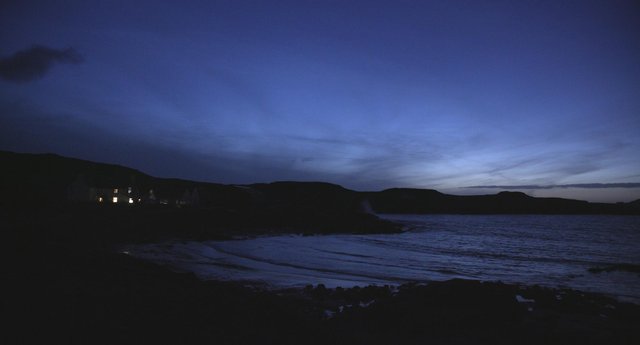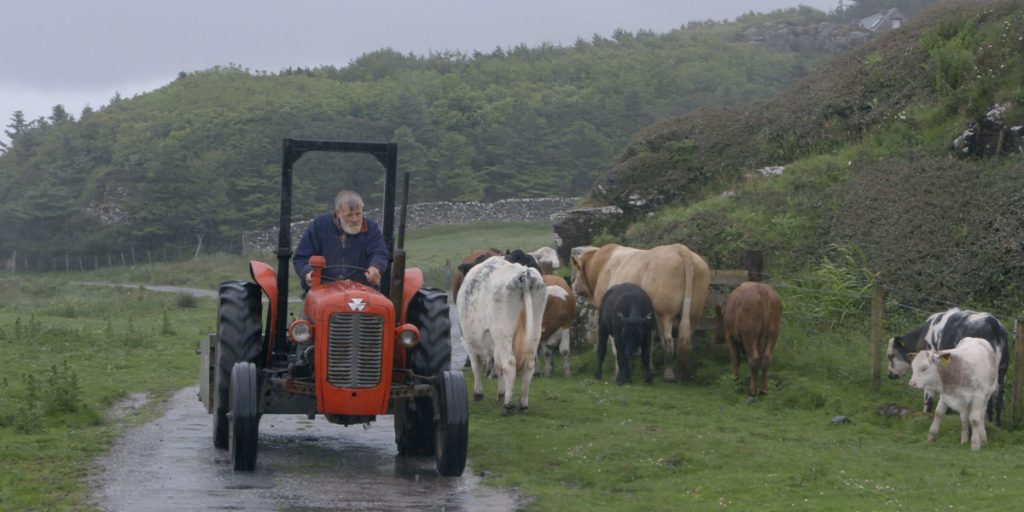Moving and quiet, Cindy Jansen’s documentary Prince of Muck takes the audience on an atmospheric, grounded journey to the remote reaches of the world.
In its most reductive sense, Prince of Muck is a friendly, real-life story of an elderly man who loves cows. A charming opening scene shows Lawrence MacEwan (the titular Prince of Muck) petting two of these animals on the seafront, a smile across his face as broad as you’ll ever see as he proudly proclaims his adoration for all things bovine. Dig deeper however, and Prince of Muck is so much more than this; it is, amongst many things, a singular and unique snapshot of a place and a people in flux, some stuck in old ways and habits, others looking to the future, all of them tethered to this secluded spot in the Small Isles (itself part of the Inner Hebrides of Scotland). It is also a sparkling advert for the power of family and community, as well as a realistic portrayal of both the hardships and rewards of farming life. In only 77 minutes, director Cindy Jansen (Come Spring, Auld Lang Syne) captures the very essence of the Isle of Muck in all its splendour and isolation, delivering a memorable, quaint and – above all else – wholly different documentary.
The isle itself is one that has been within the MacEwan family since the late 1800s, first with Lawrence’s uncle, then to his late father, and finally with his brother before being inherited by Lawrence himself. With only a double-digit population living on this vast landscape, the MacEwans own the isle and their family farm. It is a hunk of land unknown to most of the world, yet to the MacEwan family – and to Lawrence in particular – it is a large part of who they are. Prince of Muck shows us that ownership has, more or less, passed onto Lawrence’s son, Colin, whose rare appearances on camera and lack of interviews strike a sense that the inheritance of the isle is more of a chore than a labour of love, a sense that is backed up by other interviews with the family.
Lawrence can’t seem to comprehend why anyone would want to leave the isle; both his wife and daughter urge him to understand that Colin’s choice – whether it is stay or go – needs to be respected, yet Lawrence only silently reacts to this news. It’s a striking moment that signals the difficulties of inheritance. Do you, as the child, accept what your parent has handed down to you or do you cut away and create your own, independent life? It’s a question that is continuously asked but never answered, hinting at a difficult situation that in time will need to be faced, long after the cameras have left.
As a documentary, Prince of Muck is an atmospheric piece of art that invokes a certain place very impressively and delves deep into the emotions and lives of the people on screen, most notably Lawrence. Through voiceovers, diary entries that his father wrote and that Lawrence continues to this day are read out, showing both men’s fascination and love for the isle whilst also touching on extremely personal matters such as suicide within their family. It is an effective angle that Jansen employs to give the human touch without ever pushing or probing the people on screen.

The finest documentaries breathe with realism and Prince of Muck is no different. To capture the beauty and sheer vastness of the isle might seem easy – you could be forgiven for thinking the land’s magnificence will speak for itself – but Julian Schwanitz’s gorgeous and measured cinematography elevates it, ensuring the landscape is captured in vivid and evocative detail. Moments of ‘fly on the wall’ techniques capture the family in their day-to-day lives, positing the audience as respectful onlookers, whilst sweeping shots of the epic fields and churning seas remind us of the grandness of the natural world.
The star of the show, however, is not the isle: it is the prince himself. Lawrence is a slightly hunched, slow-moving man with a shaggy beard and grey hair, and yet there is a childlike glint in his eye. Whether it is when he is petting his cows or frustrating (perhaps knowingly?) his wife, there is an endearing youthfulness to his actions. This is further cemented by the joy with which he talks about his childhood days, of playing with his late brother in every nook and cranny of the isle and camping out in small caves. Leaving the isle, like his brother did, has never even been a serious consideration for Lawrence. His stubbornness bears through too in his fraught relationship with his son and his reluctance to let parts of the farm go as he gets older and older. There is an air of sadness to proceedings at times as we see the very place that he loves slipping ever so slowly through his fingers.
Prince of Muck may lack the obvious power or importance of other, grander documentaries, but it is still a fabulous piece of work that opens a doorway into another world, into a place that is sure of its standing in the past but less so in the future. There is humour, drama (big and small), warmth and humanity in Jansen’s intricate documentary. Lawrence’s grandchildren playing in the fields and helping on the farm hint at the possibility of the Isle of Muck continuing under the ownership of the MacEwan family, but this is left purposefully ambiguous. Prince of Muck has a raw and natural quality about it that fits with its setting so very aptly, and Lawrence’s infectious laugh will not be the only thing that lingers fondly in your memory after the credits roll.
Prince of Muck had its World Premiere at the 2021 Edinburgh Film Festival on 19th August, 2021. The film will be screened again on Sunday 22nd.

